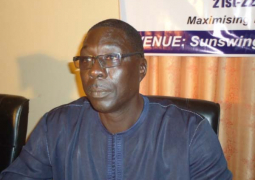The development of a plan of action on prisons reforms is an activity under a project being implemented under the auspices of the country's Judiciary, which has taken steps to improve the current prisons system to meet current world standards.
Against this backdrop, the Judiciary of the
The outcome of the seminar will be a compilation of the discussions and finalization of the plan of action with recommendations on how to structurally and institutionally improve the country’s current prisons system.
In presiding over the opening ceremony, the Chief Justice of The Gambia, Hon. Emmanuel Akimoye Agim, told stakeholders that the prisons population of the
According to him, the key objective of the seminar is to review the Prisons Act, constitution of The Gambia, criminal procedure code, Women's Act, Children's Act, together with international laws and instruments on the subject with a view to formulating a plan of action that captures the essence of improved prisons conditions in line with all the applicable laws having regard to the rights of women and children offenders, address the current prisons system and assess the social dimension of these gaps.
He said the criminal justice system in The Gambia has a separate system for adults and juveniles, noting that women do have a separate regime though they are not subject to certain punishments as, for instance, when they are pregnant.
Chief Justice Agim also stated that the purposes or function of the prisons can be surmised as confinement (incapacitation), punishment (retribution and deterrence), rehabilitation, reformation and re-integration, adding that prisons isolate the offenders from a free society and, in theory, prevent the commission of further crime.
Justice Agim believes that prisons reforms are important, because prisons can be places of gross human rights abuses, and can also constitute a threat to public health.
One cannot talk about access to justice without talking about prison conditions and reforms, and people should not view prisons as punishment centres, but instead as a correction centre, he further noted.
He concluded by commending the UNDP for their valuable support rendered to the Judiciary in the past few years, describing them as partners in the judiciary’s development.
Hon. Justice Mama Fatima Singhateh, a high court judge and the coordinator of the UNDP and Judiciary-sponsored project, also underscored the importance of the seminar, adding that the development of a plan of action on prisons reforms is an activity under the project.
"It was felt that there was a need as a key arm of government to consider how we can improve the prisons system," she added.
The purpose of the seminar, she went on, was therefore "not only to review the document, but also to come up with comments, proposals and recommendations in addressing the current gaps within our prisons system with a view to structurally and institutionally improving it."
"By coming up with an action plan, we will be a step closer to securing the required funding to effect these reforms," she concluded.
Read Other Articles In Article (Archive)


